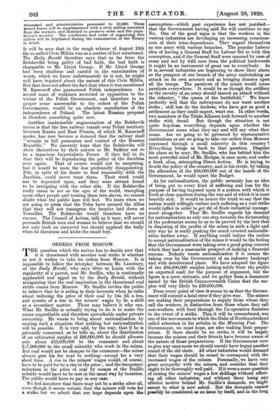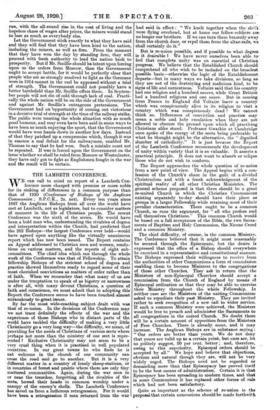ORDERS FROM MOSCOW. T HE question which the nation has to
decide now that it is threatened with another coal strike is whether or not it wishes to take its orders from Moscow. It is impossible to follow the interplay between Mr. Lansbury, of the Daily Herald, who says ditto to Lenin with the regularity of a parrot, and Mr. Smillie, who is continually applauded and egged on by the Daily Herald, without recognizing that the real inspiration in the threatened coal strike comes from Moscow. Mr. Smillie invites the public to believe that he is acting in their interests when he talks about reducing the price of their coal by 14s. 2d. a ton, and speaks of a rise in the miners' wages by 2s. a shift as a secondary matter. Those may believe it who can. What Mr. Smillie is actually trying to do is to make the mines unprofitable and therefore unworkable under private ownership. He wants to bring about nationalization by causing such a situation that nothing but nationalization will be possible. It is very odd, by the way, that if he is primarily concerned, as he tells us, about the distribution of an estimated surplus of £66,000,000 he should allocate only about L33,000,000 to the consumer and about LS7,000,000 to the small minority who work in the mines. But coal would not be cheaper to the consumer—the miner always gets his for next to nothing—except for a very short time. A rise in the miners' wages would, of course, have to be paid for by a rise in the price ; and the temporary reduction in the price of coal by means of the Smillie subsidy would have to be met in the usual way by taxation. The public would have to pay in any case.
We feel somehow that there may not be a strike after all, even though it seems certain that the miners will vote for a strike, but we admit that our hope depends upon . the assumption—which past experience has not justified— that the Government having said No will continue to say No. One of the good signs is that the workers in the various industries are developing an increasing conscious- ness of their inter-dependence. They regard themselves as one army with various branches. The popular Labour idea of having a General Staff for Labour fits in with this conception, and if the General Staff were manned by men of sense and not by wild men from the political backwoods it might be an instrument of great use to everybody. As it is, several industries are beginning to show their alarm at the prospect of one branch of the army undertaking an attack on its own account and so bringing disaster upon all the troops. The paralysis of the mines would mean paralysis everywhere. It would be as though the artillery or the cavalry of an army should launch an attack without the infantry, " the queen of the battlefield." We know perfectly well that the railwaymen do not want another strike ; still less do the dockers, who have got as good a settlement as they could expect, want one. In other words, two members of the Triple Alliance look forward to another strike with dread. But though the situation is not quite hopeless, everything depends upon whether the Government mean what they say and will say what they mean. Are we going to be governed by representative institutions or are we going to take our orders from Moscow expressed through a small minority in this country I Everything brings us bank to that question. Disguise his plans as he may, Mr. Smillie, who has behind him the more powerful mind of Mr. Hodges, is once more, and under a fresh alias, attempting Direct Action. He is trying to decide the policy of the country, and in his stride, by taking the allocation of the £66,000,000 out of the hands of the Government, he would upset the Budget.
As for nationalization, the public certainly has no idea of being put to every kind of suffering and loss for the purpose of having imposed upon it a system with which it lived at close quarters during the war and of which it is most heartily sick. It would be nearer the truth to say that the nation would willingly endure such suffering as a coal strike would inflict in order to get rid of State industrial manage- ment altogether. That Mr. Smillie regards his demand for nationalization as only one step towards the dictatorship of the proletariat seems to us to be proved by the fact that in disposing of the profits of the mines in such a light and airy way he is really pushing the much coveted nationaliz- ation further away. If anything could induce the nation to accept nationalization of the mines it would be the feeling that the Government were taking over a good going concern which they had a reasonable prospect of making a financial success. Nobody wants nationalization if it means the taking over by the Government of an industry bankrupt and with deteriorated plant. We have adopted the figure of the £66,000,000 surplus (arising solely from the profits on exported coal) for the purpose of argument, but the figure is a mere estimate, and we gather from a document issued by the British Commonwealth Union that the sur- plus will very likely be £30,000,000.
From every point of view it seems to us that the Govern- ment will commit a fatal error if they give way. The miners are making their preparations to supply those whom they call the workers, in distinction from those whom they call non-workers, with food through the Co-operative Societies in the event of a strike. This, it will be remembered, was one of the movements to which the Duke of Northumberland called attention in his articles in the Morning Post. The Government, we must hope, are also making their prepar- ations. If there should be no strike, it will be largely because the miners and their friends have become aware of the nature of those preparations. If the Government were to give way once more we should merely have begun another round of the old circle. All other industries would demand that their wages should be raised to correspond with the increased wages of the miners. Personally, we have very great sympathy with the miners, and consider that they ought to be thoroughly well paid. If it were .a mere question of raising the miners' wages a few shillings without affect- ing all other industries, and without there being any ulterior motive behind Mr. Smillie's demands, we might assent to what is now asked. But the demands cannot possibly be coneidered as an issue by itself, and in the long run, with the all-round rise in the cost of living and the hopeless chase wages after prices, the miners would stand to lose as much as everybody else. Let the Government stick exactly to what they have said and they will find that they have been kind to the nation, including the miners, as well as- firm. From the moment that they have won the day by standing firm, they will proceed with fresh authority to lead the nation back to prosperity. But if Mr. Smilhe should be intent upon forcing upon us the orders from Moscow, then the Government ought to accept battle, for it would be perfectly clear that people who are as strongly resolved to fight as the Germans were in 1914 cannot in the end be appeased without a trial of strength. The Government could not possibly have a better battlefield than Mr. Smillie offers them. In Septem- ber people will not die of cold through lack of coal. Practi- cally the whole nation will be on the side of the Government and against Mr. Smillie's outrageous pretensions. The Government had an opportunity of coming out victorious in a decisive trial of strength at the time of the railway strike. The public were treating the whole situation with so much good humour, and may even have been said in some ways to have been so much enjoying the sport, that the Government would have won hands down in another few days. Instead of that they patched up a compromise which, though it was in essence a real defeat for the railwaymen, enabled Mr. Thomas to say that he had won. Such a mistake must not be repeated. If war is forced upon the Government on the issue whether we shall be ruled from Moscow or Westminster, they have only got to fight as Englishmen fought in the war and the result will be certain.



































 Previous page
Previous page